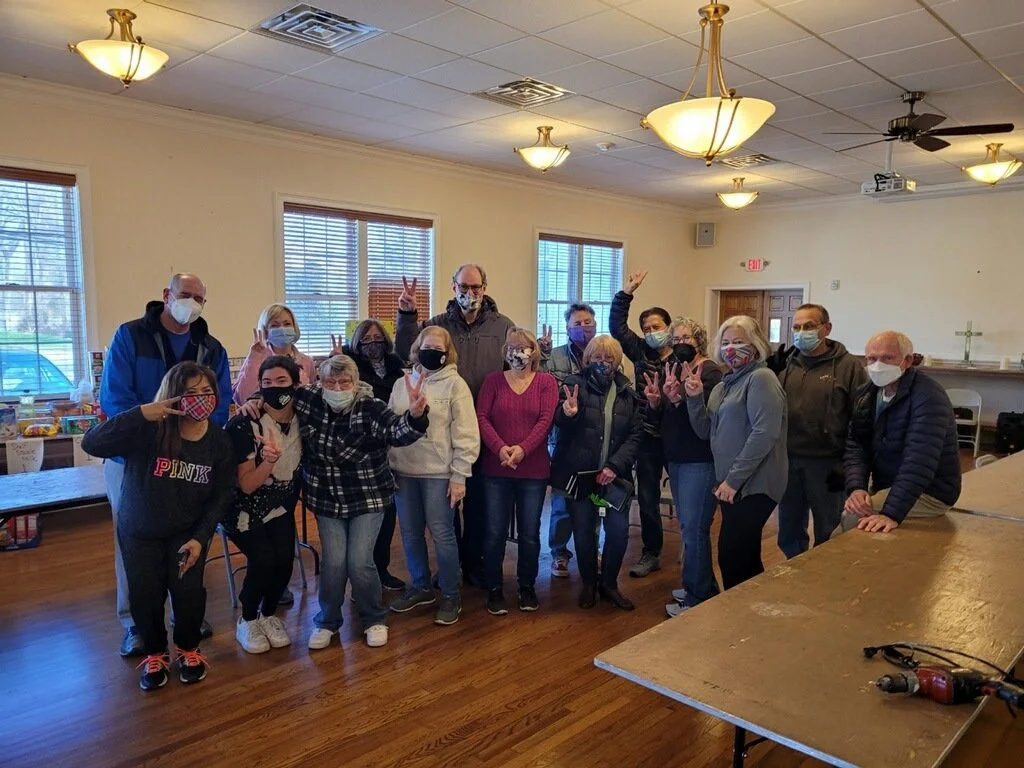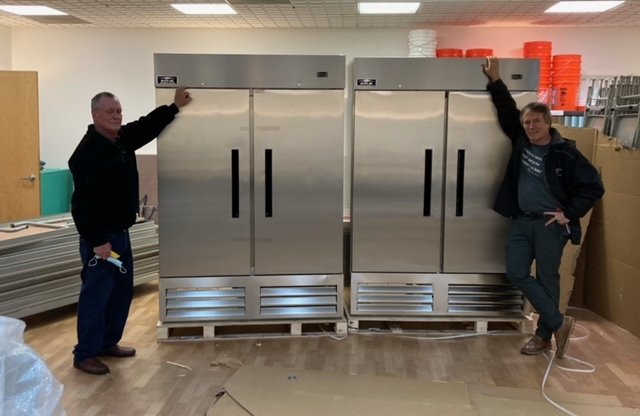Bread Breakers: New Jersey Church Finds Creative Way To Do Ministry During Pandemic
Volunteers assemble sandwiches every Friday morning at New Dover United Methodist Church in Edison, New Jersey. Photo courtesy of New Dover United Methodist Church.
When New Dover United Methodist Church in Edison, New Jersey, closed its doors in 2020 to prevent the spread of COVID-19, parishioners went home and made sandwiches.
To date, members of the New Jersey church have made almost 100,000 of them.
“When the pandemic hit, people were calling and asking, ‘What can we do?, What can we do?’” said the Rev. Chuck Coblentz. “We needed to figure out a way people could be involved, given the circumstances, without being here.”
And that’s how a sandwich ministry was born.
People could make sandwiches at home and then drop them off at the church to be delivered to nearby organizations that were feeding the hungry. To keep the sandwiches from getting soggy, a small group of volunteers added condiments right before delivery and packaged them with healthy sides, Coblentz explained.
Brian Richards and the Rev. Chuck Coblentz pose with new refrigerators purchased with a grant from the Methodist Conference. Photo courtesy of New Dover United Methodist Church.
Brian Richards, a member of New Dover UMC who has been a driving force behind the sandwich ministry, said it was just him and two women from the congregation assembling the sandwiches at first.
Now about a dozen people from three different congregations come together on Friday mornings to get the meals prepped.
“God doesn’t tell the helpless and the hungry and the poor and the downtrodden to come find a church, but he does tell us to go outside and find people,” he said, adding that he’s passionate about making sure people are fed.
Feeding the hungry isn’t unique to New Jersey parishes. Recently, a city in Oregon — Brookings — passed an ordinance barring churches in residential areas from serving more than two free meals a week to people experiencing homelessness. St. Timothy's Episcopal Church responded by suing the city.
“How do you tell a church they can't feed people?” the Rev. Bernie Lindley asked in an interview with KGW News last year. “Isn't that what churches are supposed to do? Our diocese and the Episcopal Diocese of Oregon, our churches feed people, that's instrumental in the way that we serve God and serve God's people”
There’s no law preventing the New Dover church from feeding its community, though COVID-19 has tried, unsuccessfully, to keep the ministry down.
Each week, the 225-member church provided more and more sandwiches, and soon, the ministry came to be known as “Bread Breakers,” since they continued to break sandwich making records.
Now they feed anywhere between 300 to 1,200 people per week and have a sandwich system in place. Most of the sandwiches go to surrounding towns, including Elizabeth and Plainfield, where the need is greater.
Throughout the week, parishioners — and now others from the community, including Jews and Muslims — put sandwiches in a refrigerator outside the church. Volunteers pick up sides, like chips or fruit cups, donated from area WaWa Convenience Stores and store them at the church until Friday morning, when members from the congregation assemble the sandwiches and get them ready for distribution. Richards and others from the church then take the meals to partners in surrounding counties.
“Nothing is laying around — every sandwich is eaten,” Coblentz said on a Friday afternoon in January, just after the church sent 700 sandwiches out the door.
He said the pandemic has been an opportunity to put faith into action, which is what he said church is really all about.
“Faith without works is dead,” he said. “Everything springs from the service, and we continue to let people know that faith isn’t just the reciting of the creed or altar calls — it’s getting your butt out there and doing something.”
The typical scene on Friday morning at New Dover United Methodist Church. Photo courtesy of New Dover United Methodist Church.
New Dover UMC — which has been called the most diverse congregation in New Jersey, with 40% of the congregation hailing from India — also raised $38,000 in 2021 to pay for the creation of an intensive care unit at a Christian Medical College in Vellore, India. The church continues to support the hospital through its ICU India ministry.
Coblentz said it’s ministries like these that will make the church stronger on the other side of the pandemic.
“I don’t know what the church is going to look like when it’s over — nobody does. But I think it’s going to be more powerful than it was. It’s helped people realize how much seven days a week church really is,” he said.
New Dover UMC is one of many congregations reporting intensified social outreach during the pandemic, according to data from Exploring the Pandemic Impact on Congregations.
A church in Graham, North Carolina helped fund a food truck that was donated to a school to provide a mobile feeding center for a low-income community. Another congregation launched a Memory Cafe, which provides a monthly social opportunity for people with dementia and their care partners.
“This survey of the Exploring the Pandemic Impact on Congregations study demonstrates that churches are finding innovative new ministry opportunities and outreach methods despite the countless challenges presented by the pandemic,” said project director Sarah Brown. “The creativity they’ve demonstrated through acts of service, as well as their level of adaptability, is deeply inspiring at a time when we could all use some good news.”
Coblentz hopes other churches can learn from New Dover UMC’s story and realize that they too “can do some really cool stuff” in the midst of COVID-19.
Tracy Simmons is an award winning journalist specializing in religion reporting and digital entrepreneurship. Simmons has worked as a multimedia journalist for newspapers across New Mexico, Texas and Connecticut. Currently, she teaches journalism at Washington State University and serves as the executive director of SpokaneFAVS.com, a digital journalism start-up covering religion news and commentary in Spokane, Washington.



